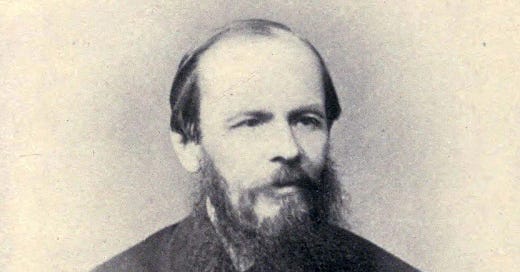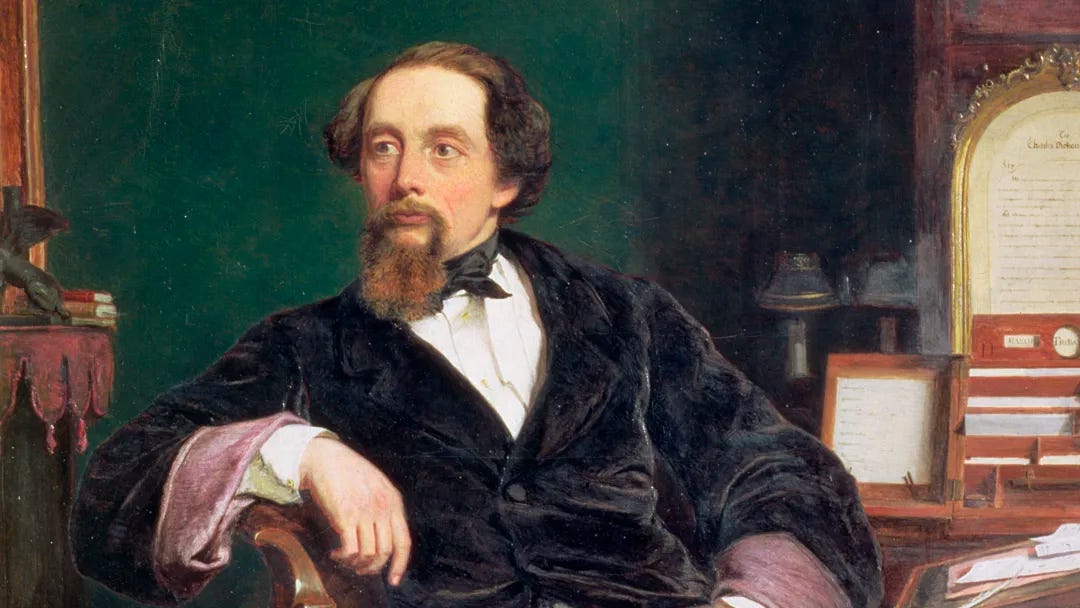The Profound Influence of Russian and German Writers on English Literature and Modern Intellectual Thought
Exploring F. Dostoevsky, Nietzsche and Kafka
Dear Readers,
Welcome to the latest edition, where we embark on an in-depth exploration of the rich legacy left by literary giants from Russia and Germany and their profound impact on English literature and the modern intellectual landscape. Writers such as Fyodor Dostoevsky, Charles Dickens, Friedrich Nietzsche, and Franz Kafka have left an indelible mark on readers and thinkers worldwide. Their works continue to resonate, inspiring creativity, introspection, and profound contemplation.
Fyodor Dostoevsky: The Depths of the Human Soul
Fyodor Dostoevsky, the Russian novelist, is celebrated for his unparalleled psychological insight and exploration of human nature. His masterpieces, including "Crime and Punishment," "The Brothers Karamazov," and "Notes from Underground," delve into the complexities of the human psyche, morality, and existential angst. Dostoevsky's characters grapple with inner turmoil and ethical dilemmas, reflecting the universal struggle between good and evil.
The Influence of Dostoevsky on English Literature
Dostoevsky's profound influence on English literature cannot be overstated. His introspective style paved the way for modern psychological fiction, profoundly impacting writers such as Virginia Woolf, James Joyce, and William Faulkner. Woolf's stream-of-consciousness technique and exploration of the inner lives of her characters can be traced back to Dostoevsky's influence. Joyce, in works like "Ulysses," delved into the intricacies of human consciousness, drawing inspiration from Dostoevsky's narrative depth. Faulkner's exploration of the Southern Gothic tradition echoes Dostoevsky's intense psychological focus.
Existential Themes and Modernism
Dostoevsky's exploration of existential themes resonated strongly with the modernist movement. His works prefigure existentialist literature, addressing questions of identity, freedom, and the meaning of life. Dostoevsky's characters often face profound moral dilemmas, mirroring the existentialist preoccupation with human freedom and the burden of choice. His influence on existentialist writers like Jean-Paul Sartre and Albert Camus is evident, as they grapple with similar themes of alienation and the search for authenticity.
Charles Dickens: The Social Conscience
Although not Russian or German, Charles Dickens' inclusion in this discussion is essential due to his monumental influence on literature and his parallel to Dostoevsky in exploring social issues. Dickens' vivid portrayal of Victorian England's social injustices in works like "Oliver Twist," "A Tale of Two Cities," and "Great Expectations" brought attention to the plight of the poor and the need for social reform.
Dickens' Impact on Social Realism
Dickens' storytelling, rich with memorable characters and intricate plots, has influenced countless English writers. His ability to blend social critique with engaging narratives has inspired authors to use fiction as a tool for social change. Writers like George Orwell and John Steinbeck drew on Dickens' legacy to address social and political issues in their works. Orwell's "1984" and Steinbeck's "The Grapes of Wrath" echo Dickens' commitment to exposing societal injustices.
Timeless Appeal
Dickens' legacy endures in modern literature, where themes of inequality and justice remain relevant. His characters, from the destitute Oliver Twist to the vengeful Miss Havisham, continue to captivate readers with their depth and humanity. Dickens' ability to evoke empathy and prompt reflection on societal norms makes his works timeless and universally relatable.
Friedrich Nietzsche: The Philosopher-Poet
Friedrich Nietzsche, the German philosopher, introduced revolutionary ideas that challenged conventional thinking. His works, including "Thus Spoke Zarathustra," "Beyond Good and Evil," and "The Birth of Tragedy," question the foundations of morality, religion, and individualism. Nietzsche's concept of the Übermensch (Overman) and his proclamation that "God is dead" have sparked intense philosophical debate.
Nietzsche's Influence on Literature
Nietzsche's influence extends beyond philosophy into literature. His provocative ideas and aphoristic style inspired writers like D.H. Lawrence, Thomas Mann, and even contemporary authors. Lawrence's exploration of human sexuality and instinct in "Lady Chatterley's Lover" echoes Nietzschean themes of breaking societal constraints. Mann's "Death in Venice" delves into the conflict between societal expectations and individual desire, reflecting Nietzsche's influence on his thinking.
Challenging Conventional Morality
Nietzsche's challenge to societal norms encourages readers to think critically and embrace their individuality. His philosophy of perspectivism, the idea that there are no absolute truths, but rather multiple perspectives, resonates with postmodern literature. Writers like Salman Rushdie and Don DeLillo explore this multiplicity of truths in their works, questioning established narratives and embracing a more fluid understanding of reality.
Franz Kafka: The Absurdity of Existence
Franz Kafka, the German-speaking Bohemian writer, is renowned for his surreal and often nightmarish tales that explore themes of alienation, existential dread, and the absurdity of modern life. Kafka's works, such as "The Metamorphosis," "The Trial," and "The Castle," depict protagonists trapped in incomprehensible and oppressive bureaucratic systems.
Kafka's Unique Style and Themes
Kafka's unique style and themes have had a lasting impact on English literature and beyond. His portrayal of the individual's struggle against an impersonal society resonates with the existentialist movement and has influenced writers like Albert Camus and George Orwell. Camus' "The Stranger" and Orwell's "1984" reflect Kafka's sense of isolation and the absurdity of existence.
The Kafkaesque in Modern Literature
Kafka's ability to evoke a sense of unease and introspection continues to captivate modern readers. The term "Kafkaesque" has entered the literary lexicon, describing situations that are absurdly complex and illogically oppressive. This concept is evident in the works of authors like Haruki Murakami and Paul Auster, who explore themes of alienation and the surreal nature of modern life.
The Modern Intellectual and Reader Base
The works of Dostoevsky, Dickens, Nietzsche, and Kafka have shaped not only literary traditions but also the modern intellectual landscape. Their exploration of profound themes—morality, justice, individuality, and existentialism—continues to challenge and inspire readers. These writers encourage us to reflect on our own lives and the society we inhabit.
The Enduring Relevance of Classic Literature
In today’s fast-paced world, where superficiality often prevails, the depth and complexity of these authors' works provide a refreshing and necessary counterbalance. They invite readers to engage in critical thinking, self-examination, and a deeper understanding of the human condition. Their exploration of timeless themes transcends cultural and temporal boundaries, making their works relevant to contemporary audiences.
The Role of Literature in Shaping Thought
Literature has the power to shape our thoughts and influence societal change. The works of Dostoevsky, Dickens, Nietzsche, and Kafka prompt readers to question established norms, consider alternative perspectives, and strive for a more just and empathetic society. Their contributions to literature and philosophy encourage us to engage with the world in a more thoughtful and nuanced manner.
Engaging with the Works of Literary Giants
To fully appreciate the impact of these literary giants, we encourage you to engage with their works directly. Here are some recommendations for diving into their rich and thought-provoking worlds:
Fyodor Dostoevsky
- "Crime and Punishment": Follow the tormented journey of Raskolnikov as he grapples with guilt and redemption.
- "The Brothers Karamazov": Explore themes of faith, doubt, and morality in this profound family saga.
- "Notes from Underground": Delve into the mind of the unnamed narrator, who challenges societal norms and explores the darker aspects of human nature.
Charles Dickens
- "Oliver Twist": Witness the trials and triumphs of an orphan boy in the harsh streets of Victorian London.
- "A Tale of Two Cities": Experience the drama of the French Revolution through the eyes of unforgettable characters.
- "Great Expectations": Follow the journey of Pip, from his humble beginnings to his pursuit of wealth and status, in this timeless coming-of-age story.
Friedrich Nietzsche
- "Thus Spoke Zarathustra": Engage with Nietzsche's philosophical novel, exploring the themes of self-overcoming and eternal recurrence.
- "Beyond Good and Evil": Challenge conventional morality with Nietzsche's provocative critique of traditional values.
- "The Birth of Tragedy": Discover Nietzsche's insights into the origins of Greek tragedy and its implications for modern culture.
Franz Kafka
- "The Metamorphosis": Enter the surreal world of Gregor Samsa, who wakes up to find himself transformed into a giant insect.
- "The Trial": Experience the nightmarish journey of Josef K., who is arrested and prosecuted by a mysterious and oppressive legal system.
- "The Castle": Follow the protagonist, K., as he navigates the baffling and inaccessible bureaucracy of the Castle.
Conclusion
The enduring legacy of Fyodor Dostoevsky, Charles Dickens, Friedrich Nietzsche, and Franz Kafka continues to shape English literature and modern intellectual thought. Their exploration of profound themes and their ability to evoke deep introspection make their works timeless and universally relevant. As we celebrate these literary titans, we invite you to immerse yourself in their worlds and discover the timeless wisdom they offer. Thank you for joining us on this literary journey. Stay tuned for more explorations into the world of literature and its impact on our lives.
Warm regards,
Makoto







